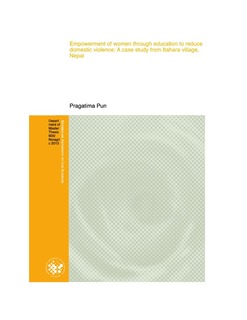| dc.contributor.author | Pun, Pragatima | |
| dc.date.accessioned | 2014-02-10T13:39:12Z | |
| dc.date.available | 2014-02-10T13:39:12Z | |
| dc.date.copyright | 2013 | |
| dc.date.issued | 2014-02-10 | |
| dc.identifier.uri | http://hdl.handle.net/11250/187929 | |
| dc.description.abstract | Home is not a safe place for many women and girls where their own intimate partners and family members seize their human rights. Women are often victims of domestic violence, and are in lack of justice due to weak law. Most often these crimes are unreported and unrecognized. This paper assesses the prevalence of domestic violence in a village in rural Nepal, and examines the associated factors relating to it. The results show that empowering women through education is the most effective tool to reduce domestic violence.
Qualitative interviews with women and men of 3 different castes were undertaken through focus group interviews. The selection of men and women for the focus group interviews were done based on their education level to examine the connection between education, employment and domestic violence. A survey was conducted including 66 households where men and women were interviewed to generate their education level and employment. The households included in the survey were selected based on a simple random sampling procedure.
16 percent of the women reported having experienced some types of violence currently. All of them were victims of psychological violence followed by physical and economic violence. Education and low economic status were found to be the main reasons of domestic violence. Majority of the participants accept education as the most important factor to reduce domestic violence.
Domestic violence is not mentioned as a major issue in the legislation of Nepal although ratifications of various national and international conventions regarding gender based violence is done. Increased importance should be put on the topic of gender based violence to be able to reduce the problem. As education is the most significant tool to reduce domestic violence, this should be given first priority to empower women. | no_NO |
| dc.language.iso | eng | no_NO |
| dc.publisher | Norwegian University of Life Sciences, Ås | |
| dc.subject | Domestic violence | no_NO |
| dc.subject | Education | no_NO |
| dc.subject | Women | no_NO |
| dc.subject | Empowerment | no_NO |
| dc.subject | Role of women | no_NO |
| dc.subject | Nepal | no_NO |
| dc.title | Empowerment of women through education to reduce domestic violence : a case study from Itahara village, Nepal | no_NO |
| dc.type | Master thesis | no_NO |
| dc.subject.nsi | VDP::Social science: 200::Women's and gender studies: 370 | no_NO |
| dc.source.pagenumber | 65 | no_NO |
